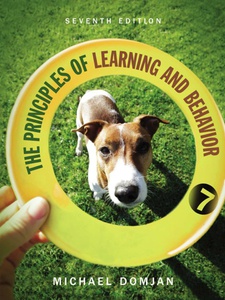
The Principles of Learning and Behavior 7th Edition by Michael Domjan, Marilyn Pooler, Carol Tamparo, Barbara Dahl
Edition 7ISBN: 978-1305142671
The Principles of Learning and Behavior 7th Edition by Michael Domjan, Marilyn Pooler, Carol Tamparo, Barbara Dahl
Edition 7ISBN: 978-1305142671 Exercise 1
Describe how historical developments in the study of the mind contributed to the contemporary study of learning.
Explanation
The historical studies of the mind and reflexes have preceded the modern studies of learning behavior. Descartes changed the view that conscious intent and free will were the only factors that formed human behavior; he noticed that some behaviors in humans were automatic and therefore behavior was dual. The automatic part of the behavior was called reflexive and was produced by a single set of nerves, and this behavior was alternate to conscious behavior only in humans; all non-human animals were believed unable to be chosen. Descartes' work became the basis for mentalism (concerned with the mind) and reflexology (concerned with mechanics of automatic behaviors.)
Mentalism and reflexology are the foundations of modern studies of the mind and behavior. Out of these two ideologies came nativism (born with innate ideas) and empiricism (born with an empty mind). Hobbes, who felt that the conscious behaviors were controlled by the same system as reflexive behavior, posed the principle of hedonism (predictability of choices that avoid pain and advance pleasure.) Those that believed ideas originated from experiences posed that memories became associated with new ideas according to rules.
As a result of early beliefs of reflexology, modern studies have disproved all of Descartes ideas. Instead of a single nerve to the pineal gland, we now know that separate nerves transmit information to different systems within the brain. We know that other substances other than secretions of the pineal can stimulate muscles, and that muscles themselves do not change volume when stimulated. We have also learned that reflexive behavior is not always simple, and at times complex and independent of the stimulus; reflexive behavior can be influenced by conscious behavior. We also now know that reflexive behavior can be learned after birth through the power of associations, and today much of the neural mechanisms of learning are based on associative analysis (though some scientists do not support association as a component of their behavior analysis results.
Mentalism and reflexology are the foundations of modern studies of the mind and behavior. Out of these two ideologies came nativism (born with innate ideas) and empiricism (born with an empty mind). Hobbes, who felt that the conscious behaviors were controlled by the same system as reflexive behavior, posed the principle of hedonism (predictability of choices that avoid pain and advance pleasure.) Those that believed ideas originated from experiences posed that memories became associated with new ideas according to rules.
As a result of early beliefs of reflexology, modern studies have disproved all of Descartes ideas. Instead of a single nerve to the pineal gland, we now know that separate nerves transmit information to different systems within the brain. We know that other substances other than secretions of the pineal can stimulate muscles, and that muscles themselves do not change volume when stimulated. We have also learned that reflexive behavior is not always simple, and at times complex and independent of the stimulus; reflexive behavior can be influenced by conscious behavior. We also now know that reflexive behavior can be learned after birth through the power of associations, and today much of the neural mechanisms of learning are based on associative analysis (though some scientists do not support association as a component of their behavior analysis results.
The Principles of Learning and Behavior 7th Edition by Michael Domjan, Marilyn Pooler, Carol Tamparo, Barbara Dahl
Why don’t you like this exercise?
Other Minimum 8 character and maximum 255 character
Character 255


